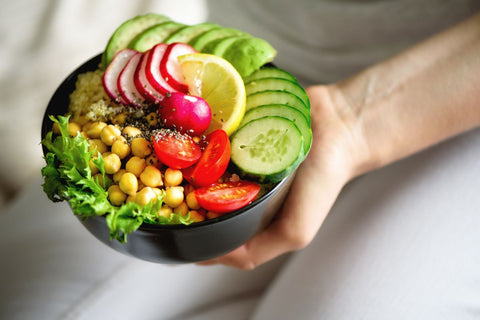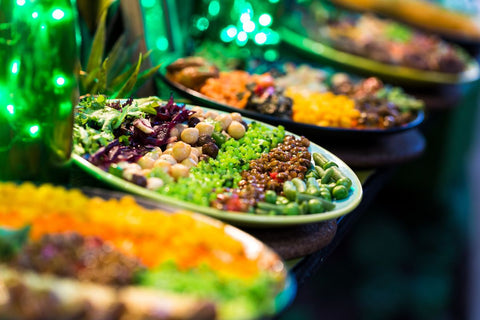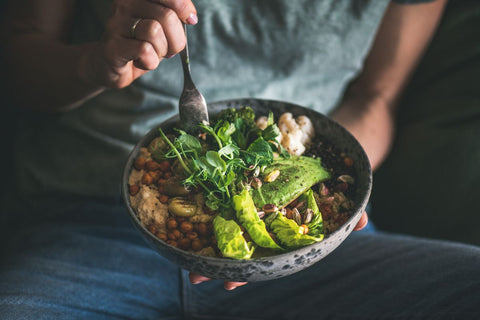Vegan Food: A Wholesome Path to Health and Compassion

Introduction
Veganism, a dietary and lifestyle choice that excludes all forms of animal products, has been steadily growing in popularity over the past few years. This is due in part to the numerous health benefits of a vegan diet, as well as the positive impact it can have on the environment.
What is Veganism?
At its core, veganism is a commitment to avoiding the use of animal products in all aspects of life. This includes not only food, but also clothing, cosmetics, and other household items. For many people, this choice is driven by a concern for animal welfare, as well as a desire to live a more sustainable and eco-friendly lifestyle.
The Growing Popularity of Vegan Food
With more and more people embracing veganism, the demand for vegan food has skyrocketed. This has led to an explosion of new and innovative vegan products on the market, from plant-based meats and cheeses to dairy-free ice cream and chocolate. Even traditional meat-centric dishes, such as burgers and sausages, are now being recreated with plant-based ingredients, making it easier than ever for people to enjoy their favorite foods without the use of animal products.
The Importance of a Vegan Diet for Health and Environment
A vegan diet is not only better for animals, but it can also have numerous health benefits. Studies have shown that a vegan diet can lower the risk of heart disease, high blood pressure, and certain types of cancer. Additionally, a vegan diet can help to reduce greenhouse gas emissions and conserve water resources, making it a more sustainable choice for the planet.
In short, veganism is a delicious and sustainable choice that offers a wide range of benefits for both individuals and the environment. Whether you're looking to improve your health, reduce your carbon footprint, or simply try something new, a vegan diet is definitely worth considering.
Benefits of Vegan Food
Health Benefits of Vegan Food
Embracing a vegan diet can bring a plethora of health benefits. By focusing on whole plant-based foods, vegans often consume more fiber, vitamins, and minerals, which can lead to improved digestion, increased energy levels, and better overall health. Studies have shown that a vegan diet can lower the risk of chronic diseases such as heart disease, diabetes, and certain types of cancer. Additionally, many people find that transitioning to a vegan diet helps them maintain a healthy weight and reduces inflammation in the body.
Environmental Benefits of Vegan Food
One of the most compelling reasons to choose vegan food is its positive impact on the environment. Animal agriculture is a major contributor to greenhouse gas emissions, deforestation, and water pollution. By opting for plant-based foods, you can significantly reduce your carbon footprint and help combat climate change. Vegan diets require less land, water, and energy to produce, making them a more sustainable choice for our planet's future.
Ethical Considerations of Vegan Food
Beyond the health and environmental benefits, veganism is rooted in ethical considerations regarding animal welfare. By choosing to avoid animal products, vegans are taking a stand against the exploitation and suffering of animals in the food industry. This compassionate approach to food consumption aligns with values of kindness, empathy, and respect for all living beings.
Many people find that adopting a vegan lifestyle brings a sense of fulfillment and purpose, knowing that their choices are contributing to a more compassionate world.

Overview of Vegan Ingredients
Vegan Organic Ingredients
Transitioning to a vegan diet can be an exciting journey, filled with new discoveries and delicious flavors. Veganism is not about restriction, but rather about embracing a wide variety of plant-based ingredients that can nourish your body and delight your taste buds. A vegan pantry is a treasure trove of organic ingredients, each with its unique taste, texture, and nutritional profile.
Hemp Seed Oil and Hemp Flour
Among the many vegan ingredients, hemp seed oil and hemp flour stand out as two exceptional choices. Hemp seed oil, extracted from the seeds of the hemp plant, is a rich source of omega-3 and omega-6 fatty acids, which are essential for brain health and reducing inflammation. It has a mild, nutty flavor and can be used in salad dressings, smoothies, or as a finishing oil for roasted vegetables.
Hemp flour, made from ground hemp seeds, is a high-protein, gluten-free flour alternative. It is a great source of fiber, iron, and magnesium, making it an ideal ingredient for vegan baking and cooking. Hemp flour can be used in pancakes, muffins, bread, and even as a thickener for soups and sauces.
Other Commonly Used Vegan Ingredients
Beyond hemp seed oil and hemp flour, there are many other vegan ingredients that can enhance your cooking and baking. Here are some key ingredients to consider:
-
Agar-agar: A vegan gelatin substitute derived from seaweed, agar-agar is a useful thickener for jellies, puddings, and ice cream.
-
Aquafaba: The strained water from a can of chickpeas, aquafaba can be whipped into a fluffy, egg-white-like consistency, making it an excellent substitute for meringues and other baked goods.
-
Gram flour: Also known as chickpea flour, gram flour is a high-protein, gluten-free flour that can be used in savory dishes like omelets, pancakes, and flatbreads.
-
Nutritional yeast: A deactivated yeast with a cheesy, nutty flavor, nutritional yeast is a popular vegan ingredient for adding depth and richness to dishes like mac and cheese, sauces, and soups.
-
Tempeh: A fermented soybean product, tempeh is a high-protein, versatile ingredient that can be marinated, grilled, or crumbled into dishes like stir-fries, stews, and salads.

Vegan Diet Basics and How to Get Started
Types of Vegan Diets
When embarking on a vegan journey, it's essential to understand the different types of vegan diets available. Here are some common variations:
-
Whole-Food, Plant-Based Diet: Focuses on whole, minimally processed plant foods like fruits, vegetables, whole grains, legumes, nuts, and seeds.
-
Raw Vegan Diet: Involves consuming uncooked and unprocessed plant-based foods to preserve their nutrients.
-
Junk Food Vegan Diet: Includes processed vegan foods like vegan burgers, fries, and sweets.
- High-Protein Vegan Diet: Emphasizes protein-rich plant foods like tofu, tempeh, lentils, and quinoa.
Each type of vegan diet offers unique benefits and challenges, so it's important to choose one that aligns with your health goals and lifestyle.
How to Plan a Vegan Meal
Planning a balanced vegan meal involves incorporating a variety of nutrient-dense foods to ensure you're meeting your nutritional needs. Here's a simple guide to crafting a well-rounded vegan meal:
-
Include Protein: Opt for plant-based protein sources like beans, lentils, tofu, tempeh, and quinoa.
-
Add Colorful Vegetables: Fill your plate with a rainbow of vegetables to get a wide range of vitamins, minerals, and antioxidants.
-
Incorporate Whole Grains: Choose whole grains like brown rice, quinoa, oats, and whole wheat bread to provide fiber and essential nutrients.
-
Healthy Fats: Include sources of healthy fats like avocados, nuts, seeds, and olive oil for heart health and satiety.
- Don't Forget Calcium: Incorporate calcium-rich foods like fortified plant milks, tofu, leafy greens, and almonds to support bone health.
How to Ensure a Balanced Vegan Diet
Ensuring a balanced vegan diet involves paying attention to key nutrients that may be lacking in a plant-based diet. Here are some tips to maintain balance:
-
Vitamin B12: Consider taking a B12 supplement or consuming fortified foods to meet your needs.
-
Iron: Include iron-rich plant foods like lentils, spinach, tofu, and pumpkin seeds to prevent deficiency.
-
Omega-3 Fatty Acids: Incorporate sources of ALA, such as flaxseeds, chia seeds, and walnuts, or consider an algae-based DHA supplement.
- Protein: Aim to include a variety of plant proteins throughout the day to ensure you're meeting your protein requirements.
How to Read Food Labels
Reading food labels is crucial for identifying vegan-friendly products and ensuring they meet your dietary preferences. Look for labels that indicate "vegan," "plant-based," or check the ingredient list for any animal-derived ingredients like gelatin, honey, or dairy products. Familiarize yourself with common non-vegan additives to make informed choices when shopping.

Vegan Food and Nutrition
Nutrients in Vegan Food
A well-planned vegan diet can provide all the necessary nutrients for a healthy lifestyle[3]. The key is to focus on variety and include a little bit of everything in your daily diet. Fruits, vegetables, whole grains, beans, nuts, seeds, and fortified plant-based dairy products are essential components of a balanced vegan diet.
How to Get Enough Protein, Iron, Calcium, and Vitamin B12 on a Vegan Diet
-
Protein: Vegan sources of protein include legumes (beans, lentils, and peas), seeds, and nuts. Soy products like tofu, tempeh, and soy milk are also excellent protein sources.
-
Iron: Fortified breads and cereals, soybeans, dark leafy greens, beans, rice, pasta, and dried fruits are good vegan sources of iron. Consuming vitamin C-rich foods with iron-rich foods can enhance iron absorption.
-
Calcium: Plant milk and orange juice fortified with calcium, blackstrap molasses, tofu processed with calcium or nigari, soy yogurt, collard greens, tempeh, turnip greens, and kale are excellent vegan sources of calcium.
- Vitamin B12: Cereals, breads, plant milk, and meat substitutes fortified with B12; nutritional yeast; and fortified non-dairy beverages are reliable vegan sources of vitamin B12. .
How to Use Supplements and Fortified Foods
Supplements and fortified foods can help fill nutrient gaps in a vegan diet]. Vitamin B12 supplements are essential for vegans, as are vitamin D supplements, especially during winter months. Vegan DHA and EPA supplements, iodine supplements, and low-dose calcium supplements may also be beneficial for some vegans.
Five Simple Guidelines for Good Vegan Nutrition
-
Eat at least three servings per day of beans, tofu, tempeh, soy milk, veggie meats, peanuts, or peanut butter.
-
Consume a wide variety of fruits and vegetables, including leafy greens and dark orange vegetables plus good sources of vitamin C like peppers, citrus fruit, and strawberries.
-
Get most of your fat from healthy sources, like nuts and nut butters, avocados, seeds, and moderate amounts of oils. Also, make sure to consume a good source of the essential omega-3 fats found in flax or chia seeds, canola oil, and walnuts.
-
Eat three cups of calcium-rich foods every day, including fortified plant milks, fortified juices, tofu made with calcium sulfate, and cooked kale, collards, bok choy, or turnip greens (double the amount of greens if you eat raw greens instead of cooked).
- Don't shun supplements as "unnatural." They're an inexpensive, easy, and reliable way to avoid deficiency. All vegans need vitamin B12 from supplements or fortified foods. Most also need to supplement vitamin D, especially during the winter months. You may also decide to take vegan DHA and EPA supplements. If you don’t regularly use iodized salt, it’s prudent to take an iodine supplement. Vegans who don’t eat enough calcium-rich foods will benefit from a low-dose calcium supplement.
Top 10 Vegan Recipes Using Hemp Seed Oil and Hemp Flour
Vegan Hemp Seed Oil Salad Dressing
This refreshing salad dressing combines the nutty flavor of hemp seed oil with tangy lemon juice and a hint of garlic. Simply whisk together hemp seed oil, lemon juice, minced garlic, salt, and pepper for a delicious dressing that pairs perfectly with fresh greens, cherry tomatoes, and cucumber slices.
Hemp Flour Vegan Pancakes
Start your day with fluffy and nutritious vegan pancakes made with hemp flour. Combine hemp flour, almond milk, a flax egg, baking powder, and a touch of maple syrup for a wholesome breakfast treat. Serve these pancakes with fresh berries and a drizzle of maple syrup for a delightful morning meal.
Vegan Hemp Seed Energy Bites
These energy bites are the perfect on-the-go snack packed with the goodness of hemp seeds. Mix together hemp seeds, dates, almond butter, and a dash of cinnamon. Roll the mixture into bite-sized balls and refrigerate for a quick and energizing snack to fuel your day.
Hemp Flour Pizza Crust
Create a delicious and gluten-free pizza crust using hemp flour. Combine hemp flour, yeast, warm water, olive oil, and a pinch of salt to form a dough. Roll it out, add your favorite toppings, and bake for a crispy and flavorful pizza crust that will satisfy your pizza cravings.
Vegan Hemp Seed Pesto Pasta
Elevate your pasta dish with a creamy and nutritious vegan hemp seed pesto. Blend together hemp seeds, fresh basil, garlic, nutritional yeast, and olive oil for a flavorful pesto sauce. Toss it with cooked pasta and cherry tomatoes for a simple yet satisfying meal.
Hemp Flour Banana Bread
Indulge in a moist and flavorful banana bread made with hemp flour. Mix ripe bananas, hemp flour, almond flour, maple syrup, and cinnamon for a wholesome and delicious treat. Enjoy a slice of this banana bread with a cup of tea for a delightful snack or breakfast option.
Vegan Hemp Seed Protein Smoothie
Boost your protein intake with a creamy and nutritious hemp seed protein smoothie. Blend hemp seeds, banana, almond milk, spinach, and a scoop of plant-based protein powder for a filling and energizing smoothie. This smoothie is perfect for a post-workout refuel or a quick breakfast on busy mornings.
Hemp Flour Veggie Burgers
Prepare flavorful and hearty veggie burgers using hemp flour as a binding agent. Combine black beans, grated carrots, onions, spices, and hemp flour to form burger patties. Pan-fry or bake them until golden brown and serve in a bun with your favorite toppings for a satisfying meal.
Vegan Hemp Seed Chocolate Chip Cookies
Satisfy your sweet tooth with vegan chocolate chip cookies enriched with hemp seeds. Mix together hemp seeds, almond flour, coconut oil, maple syrup, and dairy-free chocolate chips to create chewy and decadent cookies. Bake a batch of these cookies for a delightful dessert or snack.
Hemp Flour Tortillas
Wrap up your favorite fillings in homemade hemp flour tortillas for a nutritious and versatile meal option. Combine hemp flour, water, olive oil, and salt to make a soft and pliable dough. Roll out the dough, cook the tortillas on a hot skillet, and fill them with veggies, beans, and salsa for a delicious and wholesome meal.
These top 10 vegan recipes using hemp seed oil and hemp flour are not only delicious but also packed with nutrients to support your vegan lifestyle. Enjoy the versatility and health benefits of these recipes in your daily cooking routine.
Conclusion
In this blog, we've explored the many benefits of incorporating vegan food into your diet. From the nutritional advantages of hemp seed oil and hemp flour to the top 10 vegan recipes using these ingredients, we've highlighted the delicious and wholesome possibilities of a plant-based lifestyle.
Vegan food offers a wide range of health benefits, from essential nutrients like protein, iron, calcium, and vitamin B12 to the unique advantages of hemp seed oil and hemp flour. By incorporating a variety of plant-based ingredients into your diet, you can ensure a balanced and nutrient-rich meal plan that supports your overall well-being.
We encourage you to try these vegan recipes and discover the delightful flavors and textures of plant-based cooking. From salads and pancakes to energy bites and tortillas, there's a vegan recipe for every occasion and taste preference.
So go ahead, explore the delicious world of vegan cooking, and enjoy the journey towards a healthier and more conscious way of living.





